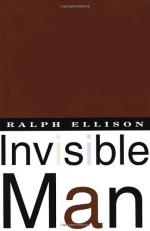|
This section contains 1,446 words (approx. 5 pages at 300 words per page) |

|
SOURCE: "Anticipations of Invisible Man: Ralph Ellison's 'King of the Bingo Game,'" in Negro American Literature Forum, Vol. 6, No. 4, Winter, 1972, pp. 122-24.
In the following essay, Guereschi reveals stylistic and thematic parallels between "King of the Bingo Game" and Invisible Man.
Many sources have been discovered for Ralph Ellison's Invisible Man, ranging from Negro folk-tale to absurdist thought. What has not been sufficiently reparded is the writer's earlier short fiction. "King of the Bingo Game," in particular, provides a revealing comparison. It is his last work (published in 1944) before the appearance of the novel in 1952, and, like it, is concerned with similar ideas of identity, self-delusion, betrayal. Likewise, it develops his familiar techniques of sardonic humor, surrealism, and symbolic vision. The protagonist also has kinship with an early model. Nameless, recently transplanted from the South, he has a low psychic "visibility" ("Who am I?") and a high...
|
This section contains 1,446 words (approx. 5 pages at 300 words per page) |

|


